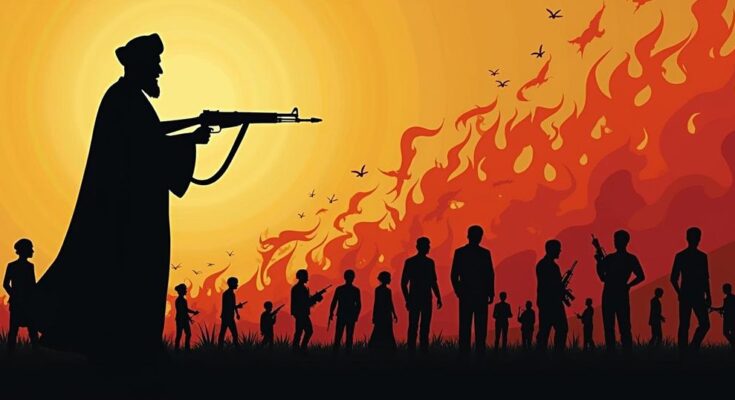Iran vows to avenge the death of Hezbollah leader Hassan Nasrallah, who was killed in an Israeli air strike. Supreme Leader Ayatollah Khamenei declares five days of mourning and reflects on Nasrallah’s significance. As tensions rise amid fears of broader conflict, Khamenei’s future decisions regarding retaliation against Israel are critical, although he hesitates to escalate into war.
Iran has issued a stern warning following the assassination of Hezbollah leader Hassan Nasrallah, asserting that his blood “will not go unavenged.” The declaration, made by Supreme Leader Ayatollah Ali Khamenei, came a day after Nasrallah was killed in an Israeli air strike in Lebanon. In recognition of this event, Khamenei decreed five days of mourning, referring to Nasrallah as “a path and a school of thought” that will endure beyond his death. Iranian media have reported that an Iranian Revolutionary Guards general was also among those killed in the airstrikes in Beirut on Friday. Israel’s military justified the strike, alleging that Nasrallah bore “the blood of thousands… on his hands” and that he had been plotting further attacks at the time of his assassination. The escalation has raised concerns regarding the potential for a wider conflict in the region, exacerbated by months of skirmishes between Israel and Hezbollah triggered by the attacks on 7 October and the subsequent war in Gaza. Central to the forthcoming reactions in the Middle East is Ayatollah Khamenei’s decision on how to proceed. Notably, he has so far refrained from committing to retaliation for the recent assaults on Hezbollah, likely due to Iran’s intention to avoid a direct confrontation with Israel. Iran has also yet to take action on its previous threats to avenge the assassination of Hamas leader Ismail Haniyeh earlier this year. In a recent statement, Khamenei called upon the Muslim community to support Hezbollah “with their resources and help,” while stopping short of explicitly threatening retaliation for Nasrallah’s death. He emphasized that “the fate of this region will be determined by the forces of resistance, with Hezbollah at the forefront.” Reports from Reuters indicate that Khamenei has been relocated to a secure location within Iran amidst heightened security, with ongoing communication between Iran and Hezbollah as they consider their next strategic moves. The Israeli strike resulted in substantial damage in Beirut’s southern suburb of Dahieh, where it was reported that Hezbollah’s central command was situated. Hezbollah has acknowledged Nasrallah’s death but has not addressed claims of additional leadership casualties during the assault. Meanwhile, Gen. Abbas Nilforoushan of Iran’s Islamic Revolutionary Guard Corps (IRGC) was also reported killed, reflecting the deep ties between these two entities, as Iran funds and trains Hezbollah to maintain its military capabilities, which surpass those of the Lebanese army. The U.S. contends that the IRGC coordinates a network of militant groups across the Middle East, collectively opposed to both the U.S. and Israel, often referred to as the “Axis of Resistance.”
This article discusses the political ramifications following the assassination of Hassan Nasrallah, the leader of Hezbollah, an organization implicated in anti-Israeli militant activities. The geopolitical context is characterized by longstanding tensions between Iran, which provides backing to Hezbollah, and Israel, which seeks to undermine such militancy. The mention of Iranian officials, including Ayatollah Ali Khamenei, speaks to the leadership dynamics within Iran and the implications of Nasrallah’s death on Middle Eastern politics, particularly in light of increasing hostilities and the potential for broader conflict amid already heightened regional tensions.
In summary, the assassination of Hassan Nasrallah has prompted Iran to vow that his blood will not go unavenged, raising the stakes in an already volatile region. Supreme Leader Ayatollah Khamenei’s call for solidarity among Muslims with Hezbollah suggests a potential for escalating tensions. Despite Israel’s justifications for the strike on Nasrallah, Iran’s measured response thus far indicates its desire to avoid full-scale conflict with Israel, even as it aligns with Hezbollah and other groups in the region.
Original Source: www.bbc.com




